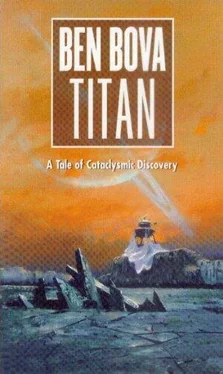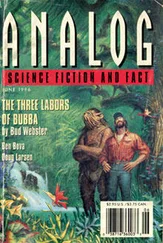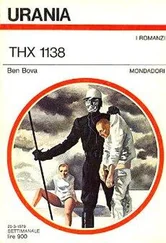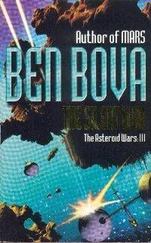“Fifty meters,” Fritz called out his altitude.
“This is the tricky part,” Gaeta said. Alpha’s roof filled his visor now. He clicked the release catches and dropped the last few meters like a dead weight as the parasail glided off into the murky distance. With a clump! that jarred his innards Gaeta hit the vehicle’s roof. His momentum pushed him to his knees and he put out his gloved hands to stop himself from tumbling over the edge of the roof.
For a few heart-pounding moments he remained on his hands and knees, puffing hard. Then, “I’m down. I’m on Alpha ’s rooftop.”
“Good,” said Fritz.
Urbain had locked himself in his office to follow the stuntman’s mission through a closed-loop hookup with the mission controllers. Von Helmholtz had offered him a virtual-reality rig, but Urbain had rejected it. I am here to rescue Alpha, he told himself, not to indulge in vicarious entertainment.
Alpha ’s controllers were down the hall at their consoles, he knew, and also linked to his desktop electronically. Urbain had ordered Habib and the rest of his computer team to stand by at the control center. Everything is in readiness, Urbain told himself. Everyone is at their posts.
He had not realized how tightly he’d been wound until Gaeta announced, “I’m down. I’m on Alpha ’s rooftop.” At that instant Urbain felt everything inside him turn to jelly. He slumped in his desk chair, too weak to lift his arms, barely able to breathe. Am I having a stroke? he asked himself. A heart attack? His face felt flushed, he was perspiring, yet he felt cold, almost shivering.
For several moments he sat there, unable to move. Then, with a deep shuddering breath, he pulled himself straighter in the chair.
He’s there with Alpha, Urbain told himself. Now the real work begins.
Gaeta reviewed his mission priorities, listed on the display splashed across one side of his visor. Check the uplink antenna. Establish contact with the master computer program. Deploy the nanomachine package to build a new uplink antenna.
Mentally he added a final priority. Get your ass out of here as soon as you can.
Climbing to his feet with a whirr and buzz of servomotors moving his arms and legs, Gaeta slowly turned around to survey the scene.
“I’m on the surface of Titan,” he announced for the benefit of the paying audience. “Standing on the roof of the roving vehicle Titan Alpha . This is not a sightseeing stunt, though. I’m here to repair Alpha and get it functioning again.”
Pecking at the keyboard inside his suit, Gaeta displayed the schematic of the uplink antenna. It was built into the forward section of the roof, half a dozen steps from where he stood. He wriggled his arm back into the suit’s sleeve and stepped carefully toward the thin lines that marked the antenna’s location.
Berkowitz’s voice came through his earphones. “We’re hearing an odd sighing sound, almost like a moan. Can you tell us what it is?”
Suppressing his irritation at being interrupted, Gaeta said curtly, “That’s the wind. You’re hearing the wind of Titan. It’s slow but steady, sort of like an ocean tide on Earth.”
Now let me get to work, he added silently.
It was difficult to look down at his boots from inside the cumbersome suit, so Gaeta stopped about a meter short of the roof’s front edge and swept his eyes along the antenna’s hairline pattern. The cameras built into his helmet were slaves to the motions of his eyes, so he knew that Urbain and his staff—and the paying customers linked to him through virtual reality—were seeing what he saw.
The audience won’t see this for a couple of hours, he thought. Takes more’n an hour to get a signal to Earth, and the censors there are delaying the broadcast just in case something comes up that frosts the religious cabrons.
“I don’t see any damage to the antenna,” Gaeta said.
For several moments he heard nothing but the hiss of static coming from the stars in his earphones. Fritz spoke up: “Urbain’s people are analyzing the imagery.”
“Looks okay to me,” Gaeta repeated. He stepped up the magnification of his optical sensors. No breaks in the antenna, no sign of damage anywhere in sight.
“Let them make that decision,” said Fritz.
Gaeta straightened up and turned slowly in a full circle, panning so that his audience could see the surface of Titan.
“This is Titan,” he said for the benefit of his audience. “It’s kinda like a smoggy day in L.A. But no buildings, no lights, no traffic or noise. You can hear the breeze, but nothing else is moving down here.” Pointing with an outstretched arm, he went on, “The ground’s kinda gooey looking. Most of it’s bland and dark in color, rolling gently. Reminds me of snowbanks after a blizzard. But this ‘snow’ is black, dull: seems to absorb light instead of reflect it.”
He looked outward toward the horizon. “Not a star in the sky, not even a glow to mark where the Sun is. Wait. There’s a smudge of something up there. Saturn, maybe. It’s just too cloudy to see anything clearly.”
Not much of a scenic view for the customers, Gaeta thought.
Fritz’s voice startled him out of his sightseeing. “Urbain wants to talk to you.”
“Fine. Patch him through.”
Several seconds of hesitation, then Urbain’s tight, tense voice. “Mr. Gaeta, your equipment includes a diagnostic probe for the uplink antenna.”
“Right,” he replied. “Got it right here on my belt.” He patted the pouch at his waist with a gloved hand.
“Please connect the probe to the antenna’s maintenance receptacle.”
“Okay.”
It was clumsy, digging the pencil-slim diagnostic probe from the pouch with his gloved hand. Gaeta nearly dropped the slender cylinder. Then he had to kneel down in the suit, no easy task, to insert the probe into the antenna’s test slot.
“Done,” he said at last, blinking sweat from his eyes.
“Good. Please activate the probe.”
“Activating.”
Urbain leaned forward in his desk chair, watching on his desktop display as Gaeta connected the probe to the antenna testing circuitry.
The antenna’s circuit schematic flashed onto the display screen. No breaks, Urbain saw. Current is flowing through the circuit as designed. The antenna is functional. There’s nothing wrong with it.
Licking his lips nervously, Urbain commanded, “Uplink stored data,” speaking as clearly as he knew how. His command was relayed at the speed of light to the control center, then to the commsats in orbit around Titan and finally to Alpha ’s central computer.
Nearly twelve seconds ticked by, as slowly as drops of blood dripping from a wound.
Uplink command aborted.
The words burned on Urbain’s display screen like a branding iron searing his flesh.
His voice quavering slightly, Urbain repeated, “Uplink all stored data.”
Uplink command aborted.
Urbain pounded a fist on his desk so hard that pain shot up the length of his arm.
He saw the yellow message light begin to blink in the lower corner of his screen. The data bar running along the screen’s bottom showed it was Habib, calling from the control center. “Answer,” Urbain gasped, rubbing his throbbing arm.
“Dr. Urbain,” said Habib, his neatly bearded face filling the screen, erasing the damning words. “We should link with the master program. Only the master program has the option of aborting commands.”
Urbain closed his eyes momentarily. Then, as calmly as he could, he replied, “Very well. Tell the stuntman to link with the master program.”
Timoshenko had a thundering headache as he walked deliberately down the corridor that led to the airlock. He’d drunk himself into a stupor the night before, sitting alone in his threadbare apartment drinking vodka concocted at one of the farms and sold clandestinely throughout the habitat. One bottle hadn’t been enough to dull the pain that surged through him like a flow of red-hot lava, so he started in on a second. As he struggled with its plastic stopper he noticed that there were no more bottles in the kitchen cabinet. He’d bought six, he distinctly remembered. Well, he told himself, I’ll have to find the guy who sells them and buy a few more.
Читать дальше












